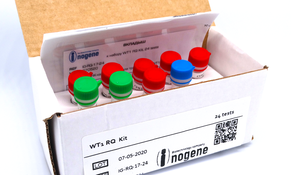
Reagent kit for quantitative determination of the WT1 gene expression levels in clinical material using polymerase chain reaction (PCR) using real-time hybridization-fluorescence detection.
This technique can be used to assess probability of relapses in patients with acute leukemias.
The kit of reagents is designed to perform PCR assay in a quantitative format for 24 clinical samples in duplicate (a total of 132 PCR reactions, including controls).
Additional information about the molecular marker:
To date, monitoring of treated AML patients for the presence of residual leukemic cells (monitoring of minimal residual disease, MRD) is mostly performed by means of molecular biology methods, being the most important approach to assessment of therapeutic efficiency. However, applicability of this approach is limited by the cohort of patients with detectable oncogene markers characteristic of leukemic cells, suitable for quantitative real-time PCR assays, e.g., chimeric PML-RARA, CBFB-MYH11, AML1-ETO (RUNX1-RUNX1T1 ), or specific mutations in FLT3 and NPM1 genes.
However, about half of AML patients are deprived of such molecular genetic aberrations. It is for this group of patients that introduction of alternative approaches to follow elimination of tumor cells is a key factor in assessing therapeutic efficiency. Quantitative real-time PCR (RT-PCR) for detection of gene transcripts is among these approaches. Their expression is significantly higher in leukemic cells relative to normal bone marrow and peripheral blood cells. Among possible candidate genes, WT1 (Wilm's tumor) is the most described. The WT1 gene is located at the 11p13 locus and encodes a transcription factor of the “zinc fingers” type, which performs a whole range of functions in the cell, depending on the mRNA splicing variant. One of the main functions of WT1 during normal hematopoiesis is to induce differentiation of hematopoetic stem cells to the myelo-monocytic lineage. Similarly, WT1 is normally a tumor suppressor, and it is responsible for mRNA maturation.
WT1 gene overexpression has been found in a number of blood malignancies, including acute myeloid leukemia (AML). High expression of WT1 occurs in more than a half of AML patients, and it is a factor of dismal prognosis, and high risk of relapse (3). Since RT-PCR may reveal distinct differences in WT1 transcript levels between normal and leukemic cells, WT1 expression may be a useful marker for assessing minimal residual disease in those patients who do not exhibit major chromosomal abnormalities, or specific gene mutations in leukemic cell populations.
Related publications:
- Yang L, Han Y, Suarez Saiz F, Minden MD. A tumor suppressor and oncogene: the WT1 story. Leukemia. 2007 May;21(5):868-76. Epub 2007 Mar 15.
- Leif W. Ellisen, Nadia Carlesso, Tao Cheng, David T. Scadden, and Daniel A. Haber The Wilms tumor suppressor WT1 directs stage-specific quiescence and differentiation of human hematopoietic progenitor cells. EMBO J. 2001 Apr 17; 20(8): 1897–1909.
- Liu-Yin, J. et al. (2008) Predictive value of minimal residual disease (MRD) monitoring by RQ-PCR in WT1 positive patients entered in the UK MRC AML-15 Trial. Blood 112, 259.
- GabertJ, Beillard E et al. Standardization and quality control studies of real-time quantitative reverse transcriptase polymerase chain reaction of fusion gene transcripts for residual disease detection in leukemia – a Europe Against Cancer program. Leukemia. 2003 Dec;17(12):2318-57.
- van der Velden, V.H., Hochhaus, A., Cazzaniga, G., Szczepanski, T., Gabert, J., and van Dongen, J.J. (2003) Detection of minimal residual disease in hematologic malignancies by real-time quantitative PCR: principles, approaches, and laboratory aspects. Leukemia 17, 1013.
- Beillard, E. et al. (2003) Evaluation of candidate control genes for diagnosis and residual disease detection in leukemic patients using ‘real- time’ quantitative reverse-transcriptase polymerase chain reaction (RQ- PCR) - a Europe against cancer program. Leukemia 17, 2474.
Ordering information:
- WT1 RQ Kit, 24 tests Cat.No IG-RQ-17-24
WT1 RQ Kit, 48 tests Cat.No IG-RQ-17-48
Additiional reagents:
Blood RNA stabilizer medium Cat.No IG-RSB-100
TriZ Reagent Kit Cat.No IG-TRK-100
ReverZyme Kit Cat.No IG-RT-1
Erythrocyte Lysis Solution Cat.No IG-TRL-100
Price: on request
Reagents are for research use only (RUO)